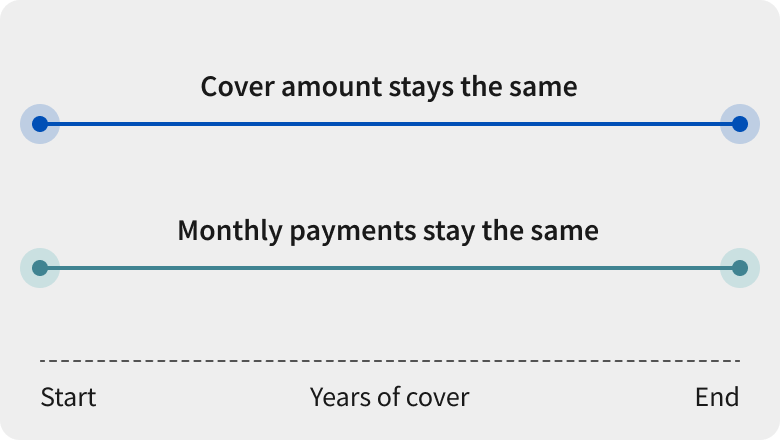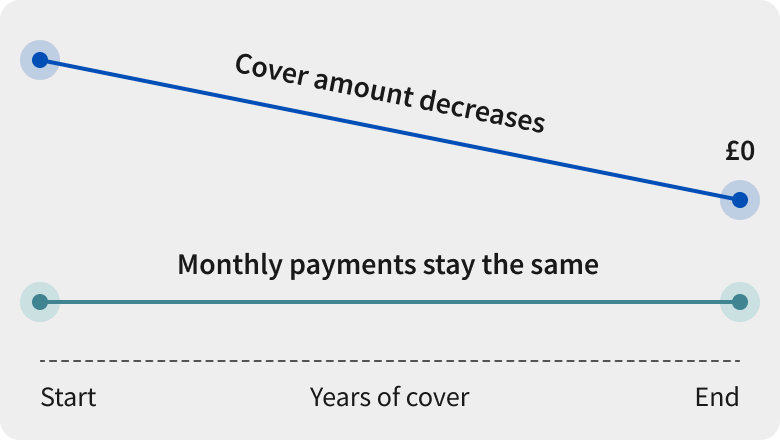What is life insurance?
Life insurance helps give your family financial protection if you pass away in the time you have your policy. It allows you to leave behind an amount of money to help those you love maintain their living standards and keep paying the bills.
You can use life insurance to cover one person (a single policy) or two people (a joint policy). But it’ll only pay out once so, once we’ve settled a claim, the policy ends.
In most cases, you can get life insurance even if you have medical conditions. You’ll need to tell us about them when we ask and it’s possible there might be a medical exam too (we’ll pay for this). The price you will pay depends on the level of cover selected and your personal circumstances.
The benefits of our life insurance
How does life insurance work?
It’s not about you. It’s about them. Our cover is term life insurance and will pay out a sum of money if during the policy term you die or are diagnosed with a terminal illness as we define it, and you’re not expected to live more than 12 months. You may wish for the money to go towards helping your loved ones. Here are a few things to think about before choosing your cover.
And if you’re unfamiliar with the language of life insurance, look up any terms you don’t understand in our life insurance glossary.
Do you need life insurance?
Take the time to think about how much money your loved ones might need to keep their standard of living if you were to pass away. This might include costs such as bills, mortgage repayments, school fees and any other debts you might need to repay.
How long do I need cover for?
Think about how long your kids will need your financial support, or when your other half might retire. If you are over 50 and want cover for the whole of your lifetime, rather than a fixed amount of time, you could consider our Over 50 life insurance.
Joint or separate life insurance policy?
If you and your partner would like combined cover, you can take out a joint policy. This pays out once and won’t provide cover for the second person after the first person passes away.
Another way would be to each take out a separate policy. So once we pay out for one person their policy will end – but the second person’s policy will continue. The cost of two policies will generally be higher than a joint policy.
Discover more in our article about choosing between joint and separate policies.
Learn about the ins, outs and in-betweens of our life insurance in our video.
Why get life insurance?
Having life insurance is probably the most important thing you can do to help protect the ones you love. When you die, your policy can leave money for those left behind. This could mean:
- Fewer bills – help pay off the debts they have left, such as a mortgage
- Peace of mind – help reduce your family's money worries at what can be a difficult time
- Financial support – to help your family carry on without you
We understand that life cover might not be right for everyone, so we're here to help you feel confident in your choices. For instance, if no one depends on you financially, you might consider other options that better suit your needs.
What is income protection insurance?
If an illness or injury means you can't work, income protection will replace at least some of what you would've earned. It'll help cover your monthly outgoings so you’re able to focus on getting better and back to work.
Learn more how income protection works.
What is critical illness cover?
If you experience one of the serious illnesses or injuries listed under this cover, you'll receive a tax-free lump sum. The money can be used in any way you like, whether that’s to help with health-related costs, monthly expenses, or lost income while you get better.
Choosing your life cover
We offer two different types of life cover: level cover and decreasing cover.
Both are what we call term insurance policies – meaning they help protect your loved ones for a fixed amount of time, or term.
The type of cover you want may depend on what you want to protect and how much you’d like to pay each month.
Family protection – level cover

Choose a lump sum to leave behind for your loved ones and select how long you want your cover to run for. You’ll pay the same amount of premium for this cover each month until your policy ends.
If you pass away during this period, the lump sum can help to maintain the living standards of loved ones. It could be used to pay off an interest-only mortgage, or go towards living costs and monthly outgoings, such as rent.
Protecting your cover from the effects of inflation
As level cover requires you to choose a lump sum payout, you can also choose to have your cover take inflation into account and increase this lump sum in line with rising prices over time.
If you take out this cover, it'll mean that your monthly payments may rise, but it also means the lump sum won't be worth less in the future because of the rise in the cost of living.
For example, a £100,000 fixed lump sum would still be valued at £100,000 in 20 years’ time. However, the price of goods and services will have increased in that time - inflation - so your money won’t go as far.
This option only applies to level cover. If you choose it, the maximum annual increase would be 15% to your premium and 10% to your cover Footnote [3]
Mortgage protection – decreasing cover

Although you don’t specifically need a mortgage to take out this cover, you might choose to do so to help your loved ones pay off a repayment mortgage or long-term loan if you pass away at any time during the policy term.
The amount you have left to pay on your mortgage usually drops over time, so mortgage protection life insurance decreases over time too. This is why it’s called decreasing cover, and why it usually costs less than level cover.
The cover lasts for a specific length of time of your choosing and your monthly premiums are fixed (unless you make changes to your policy).
Read more about mortgage protection life insurance.
Find out more about the difference between level cover and decreasing cover.
Are you eligible for life insurance?
To apply for cover, you must:
- Be in the UK, with a legal right to live there. You must consider your main home as being in the UK. You must have no current intention of moving anywhere else permanently. The UK does not include the Channel Islands, the Isle of Man or Gibraltar
- Be aged between 18 and 77
- Answer all questions we ask you truthfully
In most cases, you won’t need a medical exam. But if we do ask you to have one, we’ll cover the costs.

How much cover will I need?
It’s worth totting up how much loved ones might need to pay off a mortgage or keep up repayments, settle any debts and cover general living costs. We have a tool to do just that.
What our life insurance covers
Level cover and decreasing cover policies cover you if you pass away during the term of your policy. We’ll then pay out a cash lump sum – it’s as simple as that.
What’s covered
What’s not covered
Policy documents
See a full list of what’s covered in our policy wording.
Life Insurance Plan policy summary (PDF 104 KB)
How do I get a life insurance quote?
We only need a few details from you to get started. If you need help with your quote at any point, give us a call.
We need to know:
- whether you’d like family or mortgage protection
- how much cover you need
- how long you need it for
- whether it's for you or for you and someone else.
- if you want to add critical illness cover
- your personal information such as your name, email address and date of birth
- if you smoke
Or call us free
0800 068 5549
Monday to Friday 8:00am - 6:00pm
Weekends and bank holidays: Closed
Calls may be monitored or recorded. Calls to 0800 numbers from UK landlines and mobiles are free. Our opening hours may be different depending on which team you need to speak to.

Life insurance and critical illness cover
When you apply for life insurance, you can add critical illness cover. They’re separate policies and cover you for different things, but you can buy them together.
Because they’re not combined, a successful critical illness claim won’t affect your life insurance policy, which will still pay out if you pass away during the policy term.

Aviva DigiCare+
When you take out a new life insurance policy, you can access health and wellbeing services through the Aviva DigiCare+ smartphone app, provided by Square Health – and it won’t cost you extra. Once your life insurance policy with us is active, you can download the app and register your details. Mobile data charges may apply.
You can then use it to connect you with clinicians, nutritionists, therapists and more – which means taking positive steps towards a healthier lifestyle can be as easy as picking up your phone.
- Annual health check
- Nutrition support
- Mental health support
- Second medical opinion
- Bupa Anytime HealthLine
- Bereavement support
So the tools you need to help you eat better, feel better and keep well are always on hand.
Please be aware that the benefits of the app don’t form part of your cover, and they could change or be removed, in the future.
^This is a non-contractual benefit Aviva can withdraw at any time. Terms and conditions and the privacy policy for the Aviva DigiCare+ can be found within the app. Of course, the main reason for taking out a policy with us is financial protection, you shouldn’t take out a policy for Aviva DigiCare+ alone.
Life insurance FAQs
Can I cancel my life insurance at any time?
Does your life insurance policy cover terminal illness?
What's the difference between life insurance and over 50 life insurance?
If I receive a life insurance payout, will I need to pay tax on it?
Can I have more than one life insurance policy?
What can I do if I am struggling to keep up with my monthly payments?
Am I covered by my employer’s life insurance policy?
When should I get life insurance?
What is the average cost of life insurance?
Why choose us for life insurance?
We're proud our cover is 5 Star Rated by trusted industry expert Defaqto.

Compare cover options
We have a range of options to help you protect your family’s future.
Over 50 Life insurance
Guaranteed life insurance cover for the rest of your life that pays a lump sum once you die - you won't be asked any health questionsFootnote [4]
Age: 50-80
Premium: £5-£100
Payment: If you pass away
Critical illness cover
Pays a lump sum if you or your child are diagnosed with or have surgery for one of our 52 critical illnesses Footnote [5] covered by our plan, within the policy term
Age: 18-64
Cover: Up to £1,000,000
Payment: If you become critically ill and live for 10 days after diagnosis

Help take care of your loved ones with an Aviva Trust
Our trusts could give you more control over who your money goes to once you’re gone and will usually be exempt from Inheritance Tax Footnote [6].
Life insurance articles and resources
Get insight and useful info on protecting you and your family.




















